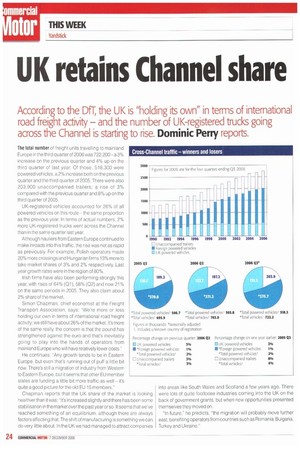UK retains Channel share
Page 24

If you've noticed an error in this article please click here to report it so we can fix it.
According to the Dfr, the UK is "holding its own" in terms of international road freight activity — and the number of UK-registered truas going across the Channel is starting to rise. Dominic Perry reports.
The total number of freight units travelling to mainland Europe in the third quarter of 2006 was 722.200 -a 3% increase on the previous quarter and 4% up on the third quarter of last year. Of those, 518,300 were powered vehicles, a 2% increase both on the previous quarter and the third quarter of 2005. There were also 203,900 unaccompanied trailers; a rise of 3% compared with the previous quarter and 8% up on the third quarter of 2005.
UK-registered vehicles accounted for 26% of all powered vehicles on this route the same proportion as the previous year. In terms of actual numbers, 2% more UK-registered trucks went across the Channel than in the same quarter last year.
Although hauliers from Eastern Europe continued to make inroads into this traffic, the rise was not as rapid as previously. For example, Polish operators made 20% more crossings and Hungarian firms 13% more to take market shares of 3% and 2% respectively. Last year growth rates were in the region of 80%.
Irish firms have also been performing strongly this year, with rises of 64% (01), 58% (02) and now 21% on the same periods in 2005. They also claim about 2% share of the market.
Simon Chapman, chief economist at the Freight Transport Association, says: "We're more or less holding our own in terms of international road freight activity; we still have about 26% of the market. It's more of the same really, the concern is that the pound has strengthened against the euro and that's inevitably going to play into the hands of operators from mainland Europe who will have relatively lower costs."
He continues: "Any growth tends to be in Eastern Europe. but even that's running out of puff a little bit now. There's still a migration of industry from Western to Eastern Europe, but it seems that other EU member states are funding a little bit more traffic as well it's quite a good picture for the old EU 15 members."
Chapman reports that the UK share of the market is looking healthier than it was: "It's increased slightly and there has been some stabilisation in the market over the past year or so. It seems that we've reached something of an equilibrium, although there are always factors affecting that. The shift of manufacturing is something we can do very little about. In the UK we had managed to attract companies into areas like South Wales and Scotland a few years ago. There were lots of quite footloose industries coming into the UK on the back of government grants, but when new opportunities presented themselves they moved on.
"In future," he predicts, "the migration will probably move further east, benefiting operators from countries such as Romania, Bulgaria, Turkey and Ukraine."


































































































































































































